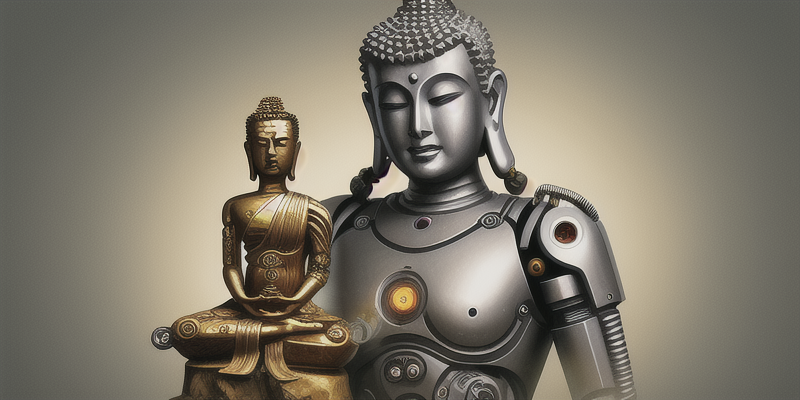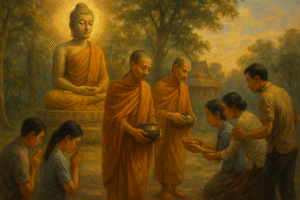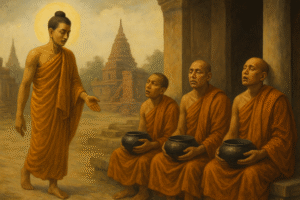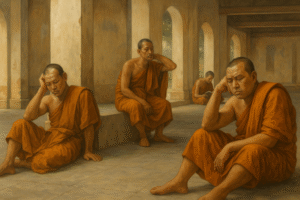In the ever-turning wheel of life, we often find ourselves caught in the rut of routine. The daily humdrum, the ordinary tasks that gradually consume us, sucking the life force within us, leaving us drained and bereft of our inner vibrancy. We perform tasks, mechanically, as if we are programmed machines, expending all our energy on tasks that bring little joy. Engaging in mundane tasks, people often find their spirits quenched, becoming lifeless from within. Amid this chaos, our potential for self-exploration, introspection, and inner self-awareness is neglected, wasted in the endless cycle of mundane tasks.
It is here that we invite artificial intelligence, or AI, to step in. This revolutionary technology promises not just increased efficiency or productivity, but a significant metamorphosis in the way we live, the way we work, the way we engage with our world. It opens up spaces for us to explore aspects of life that go beyond the physical and the material. It allows us to direct our energy towards stimulating personal and societal shifts towards spirituality and creativity, to rethink our environmental responsibilities, and to reimagine our political systems.
Imagine the profound shift AI promises in relieving us from the monotony of routine tasks. In its promise lies the liberation of human cognition, an opportunity for us to focus on the intricate and fascinating aspects of our existence. As AI takes over these daily chores, it creates a void – a quiet, peaceful space that was previously filled with constant noise and activity. This space offers an invitation to us, beckoning us to step into a world of self-reflection, contemplation, and meditation. This newfound silence could act as the spark that ignites an introspective revolution, leading to a societal shift towards spiritual exploration. Suddenly, there is a deeper meaning to life that we can strive for, a meaning that lies beyond our material successes.
Alongside this spiritual shift, AI could act as the catalyst for a significant transformation in our relationship with our environment. Much of our current environmental crisis is driven by our work-centered lifestyles, our constant search for convenience, our insatiable consumption patterns. As AI integrates more deeply into our lives, replacing traditional work structures, we could witness a substantial reduction in energy use and environmental degradation. Think of the possibilities – fewer people commuting to traditional workplaces, less business travel, more flexible work arrangements. This could be the turning point in our fight against climate change.
Our food habits, too, are likely to undergo a significant shift with the rise of AI. Freed from time-consuming tasks, we might find more time and energy to devote to preparing our meals. This shift could lead to a rise in plant-based diets, a lifestyle change that could benefit both our health and the environment. As physically strenuous jobs become less common, our calorie requirements might decrease, leading to a reduced demand for resource-intensive foods like meat and dairy. This change could potentially alleviate some of the ethical and environmental concerns associated with animal agriculture.
Beyond personal growth and environmental sustainability, AI also holds transformative potential in the realm of politics and governance. It can automate bureaucratic processes, reducing opportunities for corruption and enhancing transparency. The ability to make decisions based on data, free from personal bias or vested interests, could bring a new level of fairness and equity to governance. Policies could be grounded in reliable evidence, resources could be allocated efficiently, and the focus could be firmly set on serving the public good.
Visualize a community without corruption, where resources are dispensed with fairness, where every decision, every policy, every action is taken with integrity, with an unwavering commitment to the collective welfare. In this landscape, people aren’t embroiled in the struggles of survival borne out of inequality. Rather, they are presented with the freedom and space to thrive. And human thriving involves not just material prosperity but also spiritual blossoming.
Trust, in such a society, flourishes like a well-nourished tree, its branches spreading wide and its roots running deep. It provides the shade of assurance, a shelter of reliability under which the people can live peacefully. The absence of corruption-induced anxiety releases individuals from the mental chains of constant worry, fear, and uncertainty. Liberated from these constraints, individuals have the mental space and emotional serenity to delve deep into their inner worlds, exploring the vast expanse of their spiritual landscapes.
Now, let’s delve into the realm of education. Visualize a world where the concept of school as we know it today has been completely transformed. In this world, children don’t have to leave the comfort of their homes and parents to go to school. AI, with its wide range of capabilities, takes on tasks that a traditional school teacher might struggle to handle. It could customize lessons to suit each child’s individual learning style, pace, and interests, making learning a more engaging and enjoyable experience.
In this envisioned world, parents have the freedom to work from anywhere and spend quality time with their children, particularly during their developmental years when parental presence is most crucial. This shift would not only strengthen the parent-child bond but also lead to a richer, more rounded upbringing for the child. This model emphasizes children receiving adequate attention from their parents, leading to enhanced creativity and cognitive development. Imagine the possibilities – children developing as free-thinkers, innovators, problem solvers, all because they received the attention they needed during their formative years.
In this brave new world, we might also have the freedom to nurture our creativity in unprecedented ways. With more time on our hands and less mental clutter, we could delve deeper into the arts, literature, music, or any other creative pursuit that captures our imagination. We might find ourselves painting, writing, playing an instrument, or dancing, not because we have to, but because we want to, because it brings us joy. The unleashing of this creativity could lead to an explosion of new ideas and innovations, transforming society in ways we can’t even begin to imagine.
Lastly, imagine how AI could transform our spiritual lives. With AI handling routine tasks, we would have more time for meditation, for self-reflection, for exploring the deeper questions of life. This could lead to a widespread spiritual awakening, a shift in societal values from the material to the spiritual. Picture a world where individuals, free from the stress and distractions of everyday tasks, strive for inner peace and enlightenment. This is the transformative potential of AI. A potential not just to change our lives, but to elevate them, to help us reach for the stars while keeping our feet firmly planted on the ground. A potential to help us live, not just exist. It is now up to us to seize this potential and make the most of the AI revolution.
Artificial Intelligence is not merely a tool for increased efficiency, but a path towards a warmer, more nurturing world where each of us has the time and space to realize our true potential, to delve into our inner selves, to truly live. The question now is, are we ready to embrace this transformation? Are we prepared to use AI as a tool to not just exist, but to truly live?
As we stand on the precipice of this new era, it’s clear that the choice is ours to make. Let us approach it with open minds and courageous hearts, fully prepared to leverage these emerging technologies in ways that enrich our lives. Let’s take this chance not just to adapt, but to thrive; not just to exist, but to truly live. It is through this transformation that we shall carve our paths into an exciting future, a future defined not by fear of the unknown, but by our readiness to embrace change.





